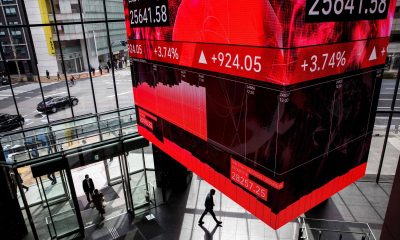Economy
Bank of Japan, Chinese growth downgrades, Microsoft – what’s moving markets

The Bank of Japan maintained its dovish stance, acting as an outlier among most major central banks. Chinese growth forecasts receive several downgrades, but Microsoft hits a record market capitalization on the back of AI optimism.
1. Bank of Japan stays dovish
The Bank of Japan was the last of the senior central banks to meet in this action-packed week and announced earlier Friday that it has maintained interest rates at ultra-low levels as well as keeping its yield curve control program unchanged.
This was largely as expected, with new Governor Kazuo Ueda just getting his feet under the table. However, he has warned that the BoJ will eventually have to change this stance, especially as inflation rises further above the central bank’s 2% annual target.
Still, as it currently stands, the Japanese central bank remains an outlier among major global central banks, with the Federal Reserve, the European Central Bank and the Bank of England all signaling more hikes to come.
This has weighed heavily on the yen, which was trading near seven-month lows versus the dollar, but also boosted the Nikkei 225 equity index to levels not seen for three decades.
2. Confidence surrounding China’s recovery wanes
The rebound in China’s vibrant economy after the severe COVID restrictions were lifted was meant to power the global economy this year as Western central banks tackled inflation.
However, this theory is looking very outdated, as a slew of data shows a post-COVID recovery was faltering in the world’s second largest economy.
Bank of America earlier Friday joined a growing list of major Western banks to cut their China economic growth forecasts for 2023, saying it now expects the economy to expand 5.7% this year, compared with an earlier estimate of 6.3% growth.
JPMorgan had earlier trimmed its outlook to 5.5% from 5.9%, while UBS economists cut their GDP forecast to 5.2% from 5.7% and Standard Chartered lowered its 2023 growth forecast to 5.4% from 5.8%.
The People’s Bank of China has cut a couple of key interest rates this week, but it looks almost certain that Beijing will need to do more to stimulate this important regional growth driver.
3. Futures just higher; Michigan sentiment data due
U.S. futures traded marginally higher Friday heading into the long weekend, as investors turned their attention from the Federal Reserve to the release of data that should provide clues to the future economic outlook.
At 04:45 ET, the Dow futures contract had climbed 25 points or 0.1%, S&P 500 futures rose 4 points or 0.13%, and Nasdaq 100 futures climbed 20 points or 0.1%.
The main equity averages are on course to record winning weeks after the Fed paused its rate-hiking cycle earlier this week after 10 consecutive increases since last year.
The broad-based S&P 500 is up nearly 3% so far this week, on pace to register its best weekly performance since March. The tech-heavy Nasdaq Composite is up nearly 4%, while the blue-chip Dow Jones Industrial Average has gained 1.6%.
Fed chair Jerome Powell indicated that future rate decisions would be made on a meeting-by-meeting basis, putting the focus on upcoming economic data as guides to future action.
The University of Michigan’s consumer sentiment reading is next on the slate and is expected to show a reading of 60 in June, up from 59.2 in the previous reading.
In corporate news, Virgin Galactic has announced plans for its first commercial space tourism flight at the end of this month, while computer software company Adobe impressed with its quarterly results.
4. Microsoft in demand on AI optimism
Microsoft is the latest hot ticket on Wall Street, with the software giant’s stock closing at a record high on Thursday, resulting in a record market capitalization of $2.59 trillion.
Microsoft’s ambitions in the lucrative video games market received a blow earlier this week after a U.S. judge granted the Federal Trade Commission’s request to temporarily block the tech colossus’s acquisition of Activision Blizzard.
However, it’s the move into artificial intelligence which has captured the imagination of investors, with Microsoft rolling out a host of AI upgrades, including ChatGPT, to Azure cloud services as well as its search engine Bing.
Microsoft finance chief Amy Hood said earlier this week that “the next generation AI business will be the fastest-growing $10 billion business in our history.”
Its stock has gained more than 45% in the year to date, but more gains look possible given Microsoft is seen as a leader in the adoption of AI technology in the software industry.
5. Oil on course to end two-week losing streak
Crude prices edged lower Friday, but were still on course to register a positive week helped by optimism over demand from China, the world’s largest crude importer, as well as a weaker dollar.
By 04:42 ET, U.S. crude futures were 0.2% lower at $70.47 a barrel, while the Brent contract fell 0.2% to $75.56 per barrel.
Both benchmarks are set to record weekly gains of around 1%, snapping a two-week losing streak, after surging about 3% during the prior session.
China’s recovery is stuttering [see above], but the country’s central bank has started cutting interest rates and further assistance looks likely, stimulating activity in the second largest economy in the world.
Weak U.S. economic data has hit the dollar, which fell overnight to a five-week low versus a basket of other currencies. This makes oil, which is denominated in dollars, cheaper for foreign buyers.
Whether the market can continue to push higher “may well depend on what further improvements we see in the data and what policy actions are announced by the PBOC in the coming weeks,” said analyst Craig Erlam at MarketPulse.
“We probably can’t count on OPEC+ to do anything of significance any time soon after the Saudis were effectively forced to go it alone last week.”
Economy
Russian central bank says it needs months to make sure CPI falling before rate cuts -RBC


© Reuters. Russian Central Bank Governor Elvira Nabiullina attends a news conference in Moscow, Russia June 14, 2019. REUTERS/Shamil Zhumatov/File Photo
MOSCOW (Reuters) – Russia’s central bank will need two to three months to make sure that inflation is steadily declining before taking any decision on interest rate cuts, the bank’s governor Elvira Nabiullina told RBC media on Sunday.
The central bank raised its key interest rate by 100 basis points to 16% earlier in December, hiking for the fifth consecutive meeting in response to stubborn inflation, and suggested that its tightening cycle was nearly over.
Nabiullina said it was not yet clear when exactly the regulator would start cutting rates, however.
“We really need to make sure that inflation is steadily decreasing, that these are not one-off factors that can affect the rate of price growth in a particular month,” she said.
Nabiullina said the bank was taking into account a wide range of indicators but primarily those that “characterize the stability of inflation”.
“This will take two or three months or more – it depends on how much the wide range of indicators that characterize sustainable inflation declines,” she said.
The bank will next convene to set its benchmark rate on Feb. 16.
The governor also said the bank should have started monetary policy tightening earlier than in July, when it embarked on the rate-hiking cycle.
Economy
China identifies second set of projects in $140 billion spending plan


© Reuters. FILE PHOTO: Workers walk past an under-construction area with completed office towers in the background, in Shenzhen’s Qianhai new district, Guangdong province, China August 25, 2023. REUTERS/David Kirton/File Photo
SHANGHAI (Reuters) – China’s top planning body said on Saturday it had identified a second batch of public investment projects, including flood control and disaster relief programmes, under a bond issuance and investment plan announced in October to boost the economy.
With the latest tranche, China has now earmarked more than 800 billion yuan of its 1 trillion yuan ($140 billion) in additional government bond issuance in the fourth quarter, as it focuses on fiscal steps to shore up the flagging economy.
The National Development and Reform Commission (NDRC) said in a statement on Saturday it had identified 9,600 projects with planned investment of more than 560 billion yuan.
China’s economy, the world’s second largest, is struggling to regain its footing post-COVID-19 as policymakers grapple with tepid consumer demand, weak exports, falling foreign investment and a deepening real estate crisis.
The 1 trillion yuan in additional bond issuance will widen China’s 2023 budget deficit ratio to around 3.8 percent from 3 percent, the state-run Xinhua news agency has said.
“Construction of the projects will improve China’s flood control system, emergency response mechanism and disaster relief capabilities, and better protect people’s lives and property, so it is very significant,” the NDRC said.
The agency said it will coordinate with other government bodies to make sure that funds are allocated speedily for investment and that high standards of quality are maintained in project construction.
($1 = 7.1315 renminbi)
Economy
Russian central bank says it needs months to make sure CPI falling before rate cuts -RBC


© Reuters. Russian Central Bank Governor Elvira Nabiullina attends a news conference in Moscow, Russia June 14, 2019. REUTERS/Shamil Zhumatov/File Photo
MOSCOW (Reuters) – Russia’s central bank will need two to three months to make sure that inflation is steadily declining before taking any decision on interest rate cuts, the bank’s governor Elvira Nabiullina told RBC media on Sunday.
The central bank raised its key interest rate by 100 basis points to 16% earlier in December, hiking for the fifth consecutive meeting in response to stubborn inflation, and suggested that its tightening cycle was nearly over.
Nabiullina said it was not yet clear when exactly the regulator would start cutting rates, however.
“We really need to make sure that inflation is steadily decreasing, that these are not one-off factors that can affect the rate of price growth in a particular month,” she said.
Nabiullina said the bank was taking into account a wide range of indicators but primarily those that “characterize the stability of inflation”.
“This will take two or three months or more – it depends on how much the wide range of indicators that characterize sustainable inflation declines,” she said.
The bank will next convene to set its benchmark rate on Feb. 16.
The governor also said the bank should have started monetary policy tightening earlier than in July, when it embarked on the rate-hiking cycle.

 Forex4 years ago
Forex4 years agoForex Today: the dollar is gaining strength amid gloomy sentiment at the start of the Fed’s week

 Forex3 years ago
Forex3 years agoUnbiased review of Pocket Option broker

 Forex3 years ago
Forex3 years agoDollar to pound sterling exchange rate today: Pound plummeted to its lowest since 1985

 Forex3 years ago
Forex3 years agoHow is the Australian dollar doing today?

 Cryptocurrency3 years ago
Cryptocurrency3 years agoWhat happened in the crypto market – current events today

 World3 years ago
World3 years agoWhy are modern video games an art form?

 Commodities3 years ago
Commodities3 years agoCopper continues to fall in price on expectations of lower demand in China

 Economy3 years ago
Economy3 years agoCrude oil tankers double in price due to EU anti-Russian sanctions

































